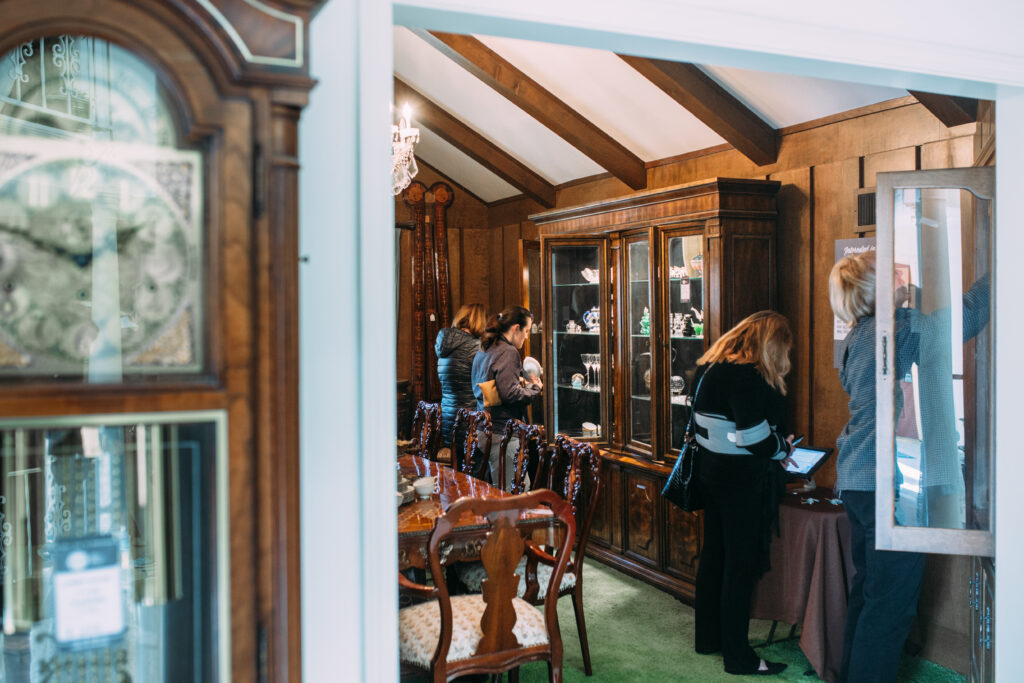An estate sale is often confused with an auction or a garage sale, but each operates differently. While estate sales have grown in popularity, many people are still unclear on how they work. In this article, we will explain the basics: what an estate sale is, why families choose this option, and how both traditional in person and online estate sales operate.
What is an Estate Sale?
An estate sale involves selling a large portion, and often the entirety, of a household’s contents within a short timeframe. The primary objective is typically to clear out the home efficiently. Estate sales can be conducted in person, online, or through a hybrid approach depending on the company and the needs of the family. Below are the key characteristics that distinguish estate sales from garage sales or auctions:
-
- All items are individually identified and prepared for sale. In a traditional in person estate sale, items are priced with set amounts and made available to the public. Prices may be discounted as the sale progresses. In an online estate sale, items are usually listed individually on a bidding platform where buyers place bids over a set period, similar to an auction format.
-
- Traditional estate sales most often take place inside the home. In some cases, items may be moved off site or combined with another estate depending on logistics, size, or company process. Online estate sales may still require onsite pickup after the bidding period ends.
-
- Estate sales typically run for one to three days if held in person, with set hours. Online sales usually run for several days to a week to allow bidding activity, followed by a scheduled pickup window.
-
- Discounting is common in traditional in person sales. For example, items may be full price on the first day, 25 percent off on the second day, and 50 percent off on the final day to encourage sell through. In online formats, competitive bidding determines the final price rather than scheduled discounts.
-
- Because of the volume of items and the coordination required, most estate sales are managed by a professional company that handles pricing, marketing, staging, buyer communication, and payment processing.


Why Have an Estate Sale?
Estate sales are a great way to get rid of a lot of items in a short amount of time. The most common reasons for estate sales are:
-
- A death in the family. When handling the estate of a loved one, liquidating their belongings allows the family to settle the estate as quickly as possible and get the real estate ready for sale. The estate sale takes the emotional weight of sorting through all the items off the family’s shoulders and provides a clear path for equitable distribution among family members.
-
- Downsizing. This is quickly becoming a popular reason for having an estate sale. Many baby boomers choose to downsize their estate after their children move out. Moving from a 5,000 sqft house to a 2,000 sqft condo creates the problem of what to do with all those items you no longer need. An estates sale facilitates all those unneeded items being sold quickly while also getting the house empty, cleaned, and ready to be sold. 80% of the sale Brown Button hosts is due to downsizing.


How Does the Estate Sale Work?
When an estate sale is managed by a professional company, they oversee the entire process from start to finish. This applies to both traditional in person sales and online estate sales. For many families, this is the most convenient option because it allows them to receive a portion of the proceeds without taking time away from work or family responsibilities. An estate sale company typically manages:
-
- Organizing and preparing items for sale. In a traditional in person sale, this often includes cleaning, sorting, and staging the home so items are attractively displayed to shoppers. In an online sale, items are sorted, photographed, cataloged, and described in detail for listing on a bidding platform. Proper presentation, whether in person or online, can significantly impact final sale prices.
-
- Researching higher value items to help ensure they are priced or positioned appropriately. This may include antiques, original artwork, fine jewelry, designer goods, coins, mid century furniture, collectibles, and other specialty items. Companies use experience, market data, and comparable sales to determine realistic market value.
-
- Marketing the sale. A successful estate sale depends on attracting qualified buyers. In person sales are promoted through local advertising, email lists, signage, and estate sale websites. Online sales are marketed through bidding platforms, email campaigns, social media, and targeted digital outreach to reach a broader audience.
-
- Managing the sale process. For in person events, this includes overseeing entry, handling negotiations or discounts, processing payments, and coordinating item removal. For online sales, it includes managing the bidding period, answering bidder questions, processing invoices, collecting payments, and organizing scheduled pickup times. In both formats, having a neutral third party handle transactions can reduce stress for families during what is often an emotional transition.
-
- Handling post sale arrangements. After a traditional sale, remaining items may be donated, consigned, or removed, and the home may be cleared for its next use. After an online sale, unsold items are similarly addressed following the pickup window. Some companies also offer cleanout services to prepare the property for listing or transfer.
Estate sale companies work with a wide range of household contents, from everyday furnishings to specialty collections. Each company has its own process, fee structure, and strengths. For that reason, it is wise to speak with multiple companies, understand whether they focus on in person, online, or hybrid sales, and choose the one that best aligns with your specific goals and timeline.







